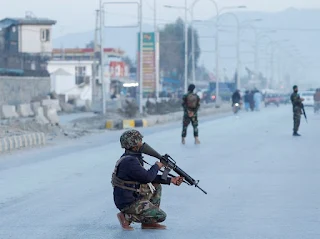The Afghan authorities on Saturday imposed a night-time curfew across 31 of the country's 34 provinces to curb surging violence unleashed by a sweeping Taliban offensive in recent months, the interior ministry said.However Taliban say there would be no curfew in Taliban controlled areas which are two third of Afghanistan.
The widespread Taliban offensive has seen the insurgents capture key border crossings, dozens of districts and encircle several provincial capitals since early May.
"To curb violence and limit the Taliban movements a night curfew has been imposed in 31 provinces across the country," except in Kabul, Panjshir and Nangarhar, the interior ministry said in a statement.
The curfew will be effective between 10:00 pm and 4:00 am local time, Ahmad Zia Zia, deputy interior ministry spokesman said in a separate audio statement to reporters.
With the withdrawal of American-led foreign forces all but complete, the resurgent
After a brief lull in violence during this week's Muslim holidays of Eid al-Azha, fighting continued again with the authorities claiming to have killed more than 260 Taliban fighters in the past 24 hours across several provinces.
Both the authorities and the Taliban exaggerate their claims, which cannot be independently verified.
US carries out air strikes even as military’s withdrawal continues
As the fighting raged in recent weeks, the US military was forced to carry out air strikes "to support" Afghan troops to repel Taliban offensives even as its overall withdrawal continues, Pentagon spokesman John Kirby said on Thursday.
Experts say a lack of regular US air support since May to Afghan forces on the ground is a key factor in government troops losing a lot of territory to the Taliban.
Late on Friday, the Taliban warned the US military against carrying out air strikes.
"It is a clear violation of the signed agreement that will have consequences," the Taliban said in a statement, referring to a landmark deal between Washington and the insurgents last year that paved the way for the withdrawal of foreign forces.
The Taliban also warned the Afghan government against launching any offensive, saying the group will "strongly defend their territories and not remain in a defensive posture if the enemy insists upon war".
The Taliban had said earlier this week that its fighters were in a "defensive" posture to mark the Eid al-Azha holidays that ended on Thursday.
Earlier this week, the chairman of the US joint chiefs of staff General Mark Milley said the Taliban appear to have "strategic momentum" on the battlefield.
With the militants putting pressure on around half of the country's provincial capitals, Afghan troops are in the process of "consolidating their forces" to protect those major urban centres, Milley added.

